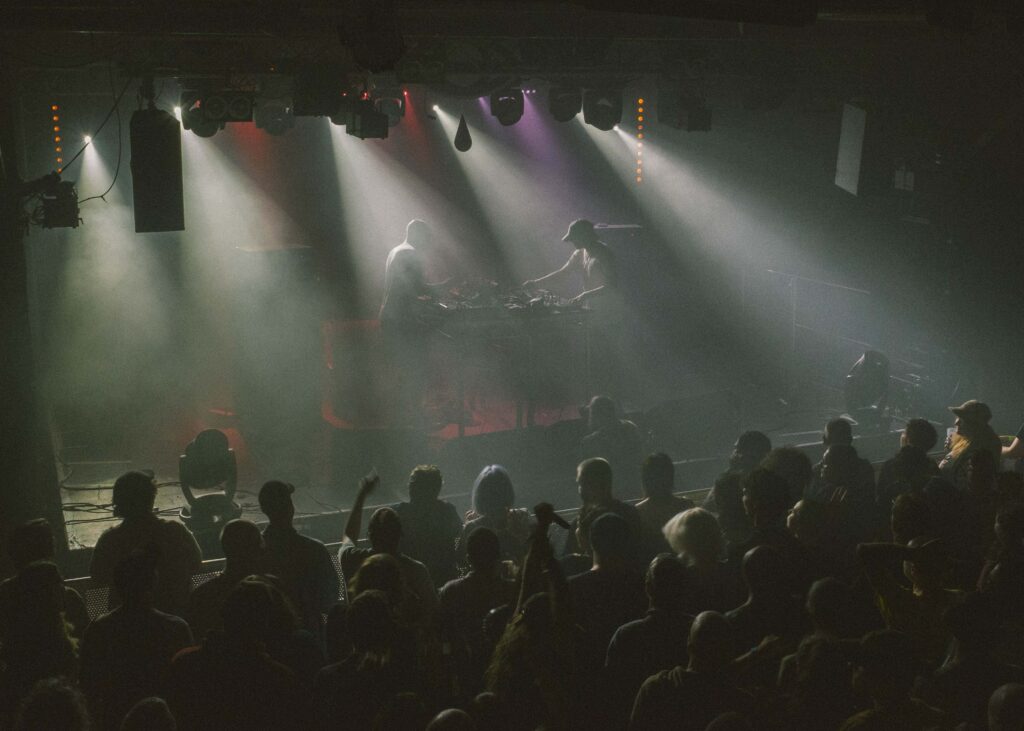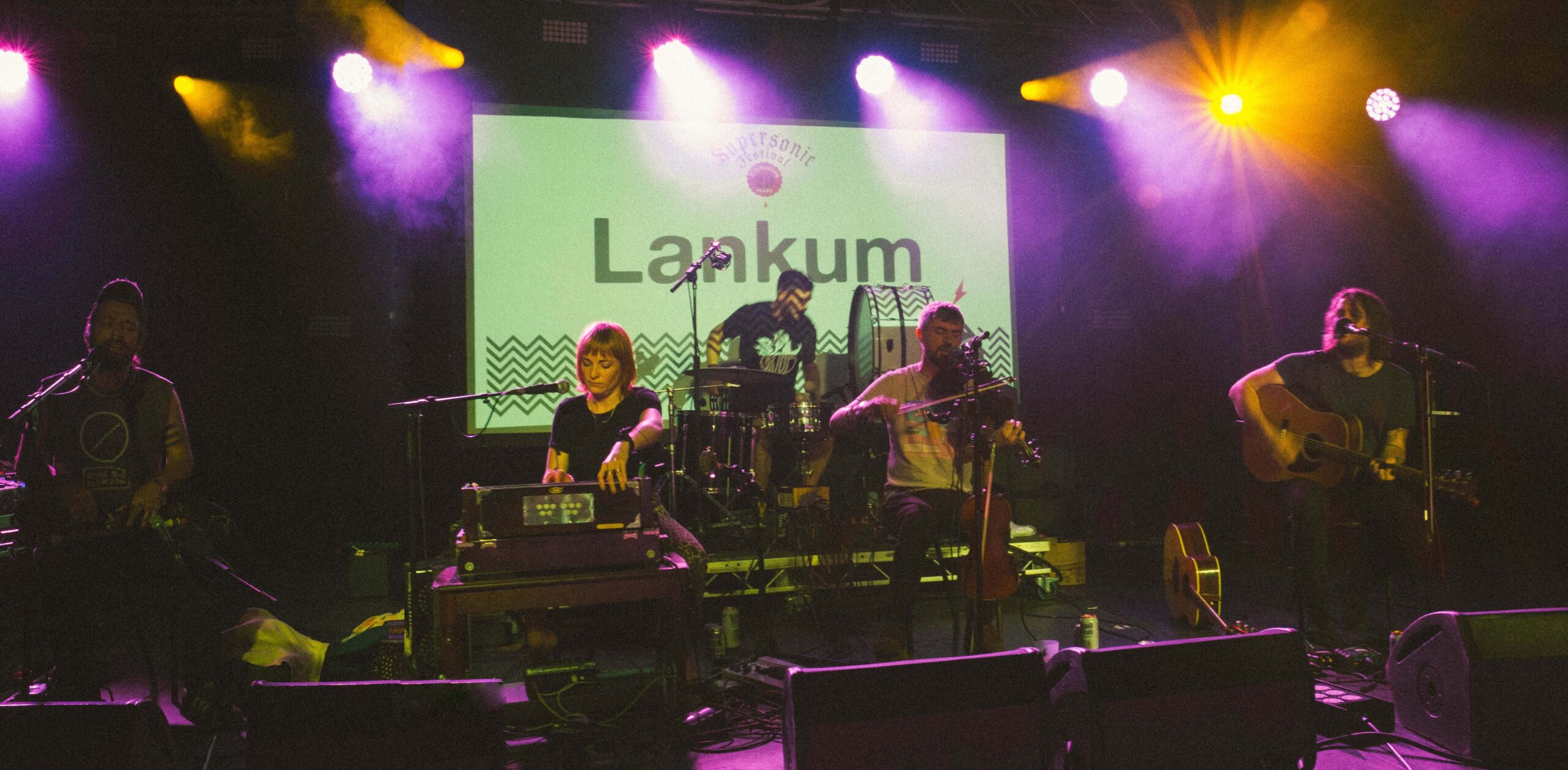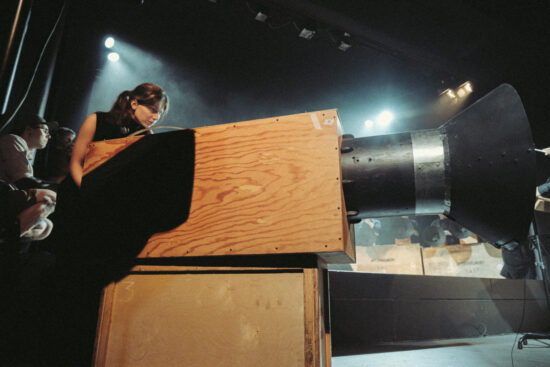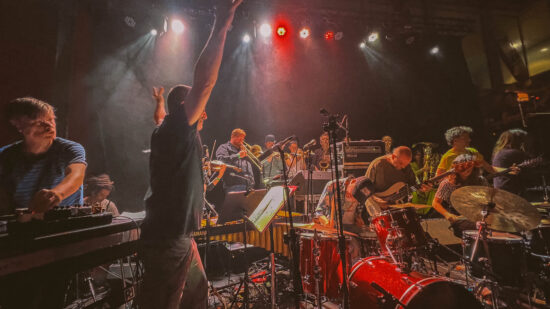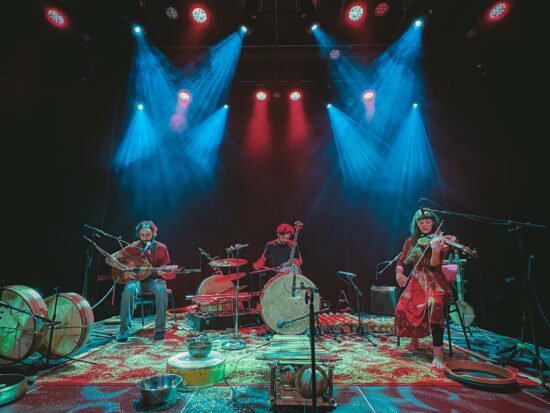Supersonic restores faith in what can be done with the guitar, that music can speak for the present, and what else the word ‘festival’ can mean.
When ‘Weather’ is heard, it is unclear how the band makes the sound. Tiny pickups vibrate across the strings of horizontally laid guitars, building an ambient shell, a rippling string vibrato. The tension grows as the musicians of Ex-Easter Island Head strike the lines one by one, creating minimalist, emergent forms that this dreamlike and stretched-out piece poignantly enhances. Their compositions are based on repetitive cycles, steadily unfolding – in ‘Norther’, they combine mallet strikes against strings and cowbells to create a trance-like spatial form. The flatpicking guitar here looks sacred, unlike the guitar ethos of holding it upright. The Liverpool-based band explores it in different ways – in the poignant ‘Magnetic Language’, they apply smartphones to the instrument, producing individual sounds, which the band transmits by striking the guitar strings, creating a growing vocal suite reminiscent of autotune. This quartet’s beauty is timeless, ephemeral, and composed extremely evocatively, emphasizing every detail, layering guitar sounds and percussion strokes.
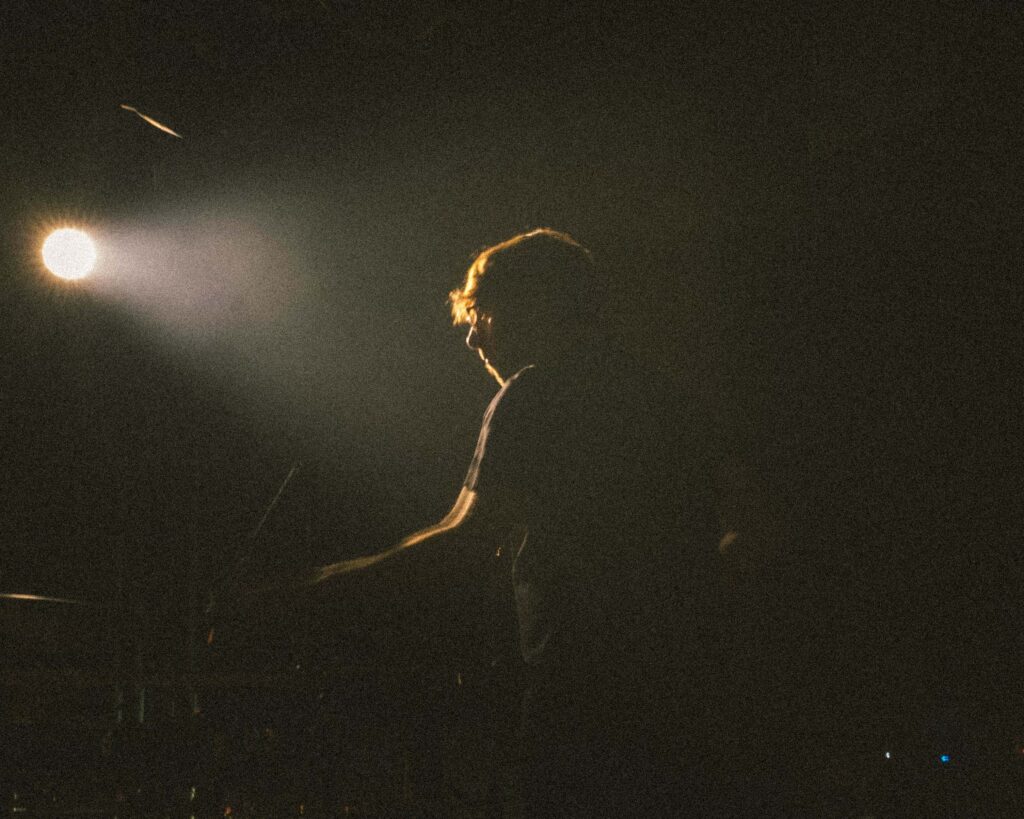
This is the only such contemplative concert. Later, a surprising and impulsive set is played by Total Luck – a loud, hardcore show full of verve and energy fills the entire 7SVN hall and surprises with youthful enthusiasm. Deerhoof also plays with gusto, serving up engaging songs on the one hand, tremendous and lively guitar parts on the other, and Greg Saunier’s ecstatic percussion playing on the third. Horse Lords play at the highest level for a while before the replacement of the drummer – from electronic variations played from a laptop to percussive polyrhythms and saxophone minimalism or Owen Gardner’s just intonation – total concentration and, at the same time, lightness. Giant Swan, who appeared in place of MC Yallah, serves up a technoid trance in a punky, noisy way at the end of the day.
Supersonic renew how we can understand ‘festival’ in an age of commercialized events, mass audiences, and food courts. Amongst capitalism’s revenue-maximising events, the Birmingham festival appears in a very different space: it’s more about a sense of community but also talking about important issues. The posters and banners at Supersonic Mass, which happens on Sunday, remind us of the importance of feeling good and being in it together. The festival is not a big-budget event, and the event is spread over two halls, a rather intimate event compared to many others in Europe. At the same time, there is no let-up in the program, which takes dense and loud music as its starting point – both musically and in terms of lyrics. It reminds us how much guitar music can still show and, on the other hand, how much music can convey caring for different groups.
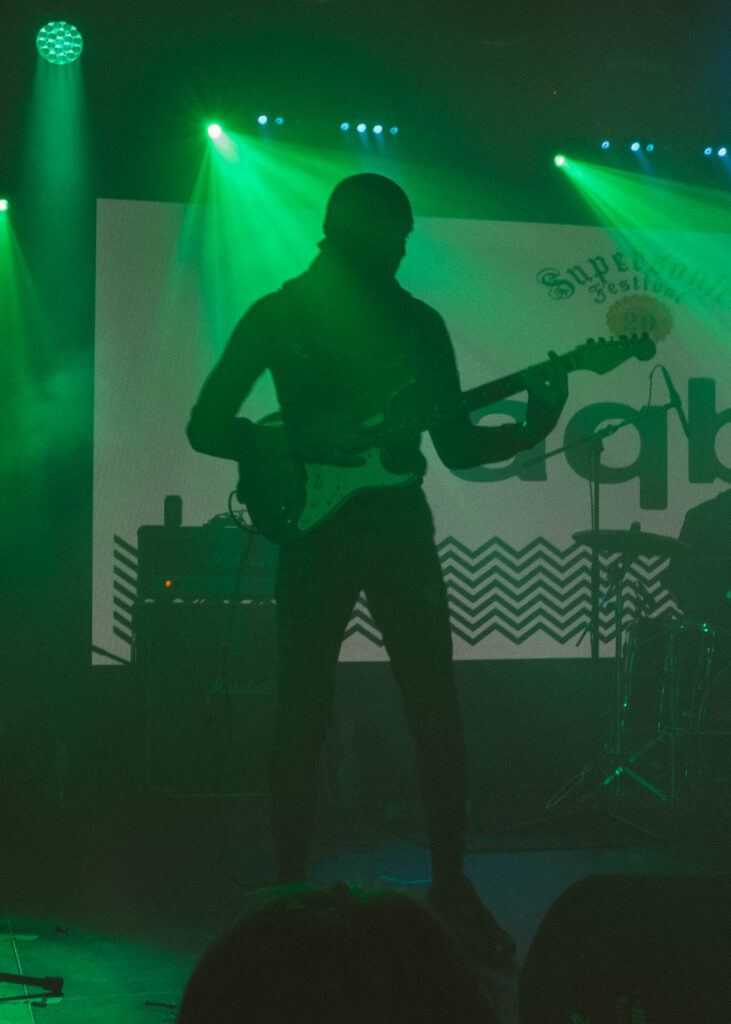
Taqbir 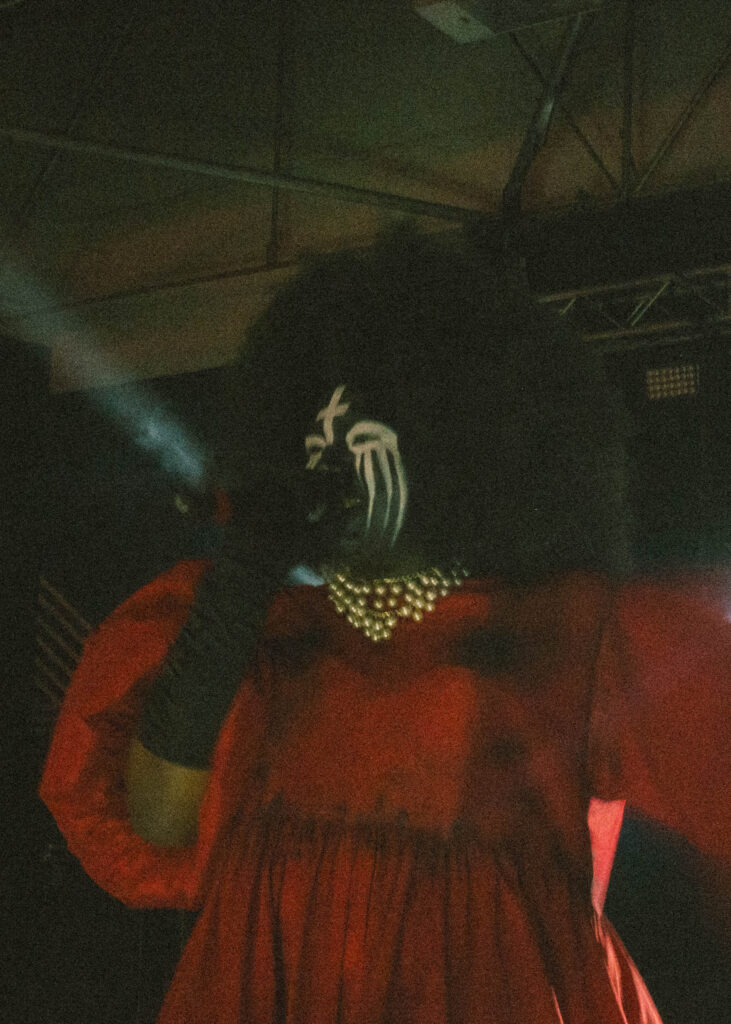
Backxwash
On the second day, Divide and Dissolve play a heavy, doomy wall of sound. “Complaining is cool, but it doesn’t do anything because people are dying and being discriminated,” says Takiaya Reed at one point, who is campaigning for indigenous sovereignty and against colonialist atrocities. She and Scarlett Shred serve up the dense instrumental heaviness a moment later. A wall of amplifiers behind them generates loud music that reaches from the floor. A darkness that is not obvious is also played by Black Myths, who, despite technical problems, defend their overdriven and hounding improvisation on drums, bass, effects kit, and dense horizontally drawn music, where the rhythm gives way to walls of sound, the music sinks in, attacking with noise.
Ragana is a queer-female duo who take turns playing drums, guitar, and singing, creating loud but dense heavy structures. They sing but also scream, shouting anger at the world. Their approach to black metal is remarkably fresh, sometimes upbeat, sometimes thick, full of uplifting songs to searing walls of sound. They also dedicate their music to queer people. Music is essential here but remember social issues. Similarly, Moroccan feminist punk Taqbir, whose musicians hide their identity while promoting freedom of expression for North African women. On the front, there is the female vocalist, who, surrounded by the rest of the band, screams and howls but also connects with the audience – and plays a short, maddening, thrilling set.
This is the first time I have had the chance to see Oxbow – their powerful-sounding but lyrical songs at the crossroads of punk and blues have incredible power. Eugene Robinson shouts, sings poignantly, and seduces the audience. He symbolically pulls down his shirt as if revealing himself to those who have come to listen to him. Backxwash is also unveiled – it’s cleansing in its way. Minimalist: with flickering lights against a backdrop bordering on hip-hop industrial metal, the artist weaves a tale of the search for identity and queerness, extremely poetically, yet in a way filled with anger, a robust beat in which beats merge with dense riffs.
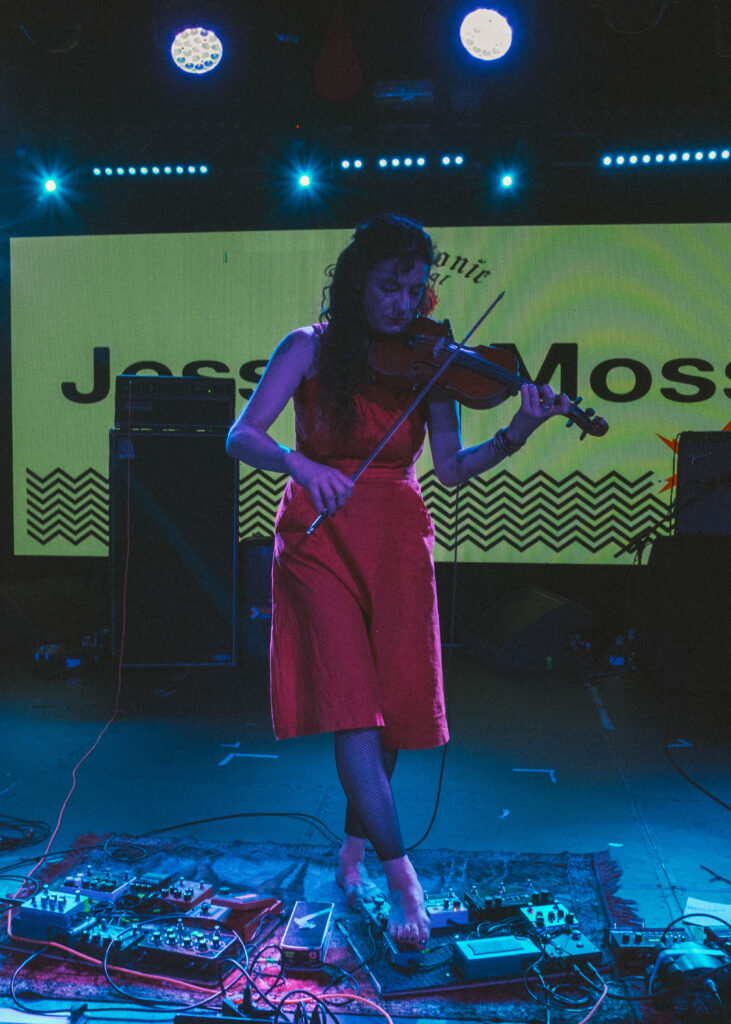
Jessica Moss 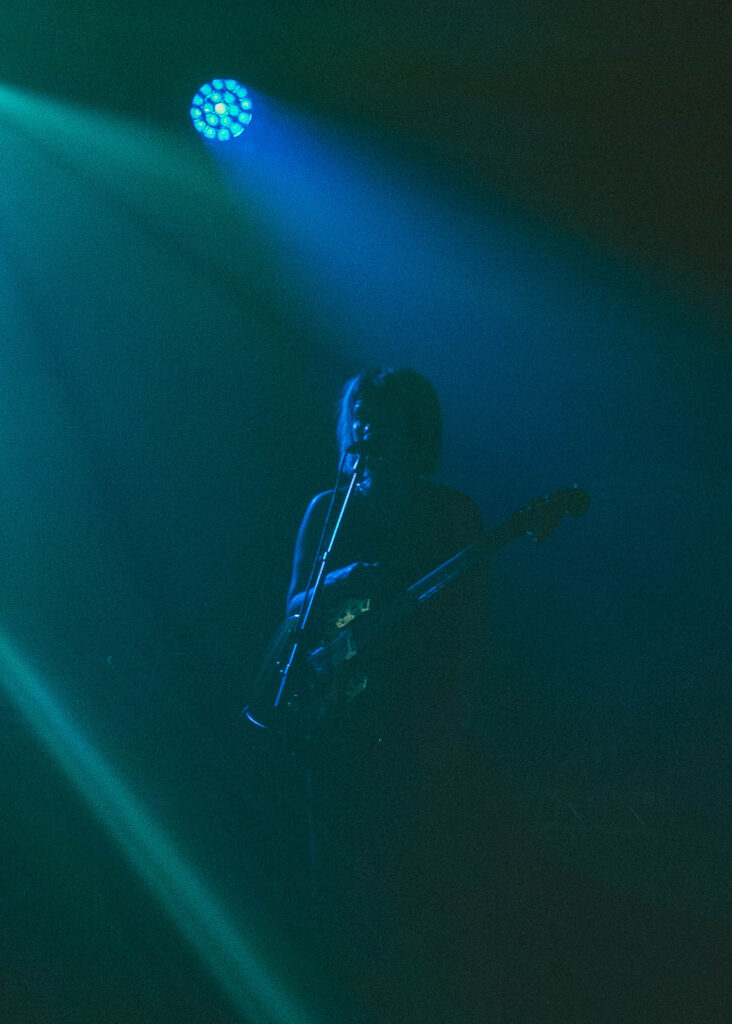
Big|Brave
The final day is the most diverse. That moment when a folk song reaches back into the past and speaks of the present. It is drawn from history to tell about today, exemplified by a capstone performance by the multi-member Shovel Dance Collective. There is room for instrument solos, a capella singing, ensemble, and orchestral playing. Significantly, the band reminds us that folk, which has always belonged to the working class, still sounds universal today, regardless of type. Their song, ‘Handsome Cabin Boy’, brilliantly demonstrates this, which originated in the 1950s and now sounds like a contemporary tale about gender boundaries.
75 Dollar Bill, which I was very much looking forward to, plays two compositions. The duo generates trance-like repetitions based on Che Chen’s guitar strumming and a resonating wooden cube resembling a cajon, which Rick Brown hits with various kinds of rattles, sticks, or percussive foot. This is focused music, primitive in its way but extremely meditative, polyrhythmic, and seductive in its long-distance form.
Festivals often have concerns about unique commissioned collaborations, but Jessica Moss & Big|Brave, no doubt, are the exception, as they play a fantastic concert. The musicians, who have known each other for a long time, create a dark post-metal tale in which powerful playing practically segues into drawn-out suites. A dense, effects-enhanced sound serenades the guitars and Moss’ violin. There is weight rhythmic playing, full of percussive cascades, and a hidden beauty that emerges between the distortion and walls of guitars and Robin Wattie’s raspy vocals once or twice.
Into the depths of darkness in the program looks Lankum. It’s paradoxical because the band plays folk music that should sound light and shanty-like. In Birmingham, the group expands the spectrum presented on ‘False Lankum’, one of this year’s best albums. They veer from lyrical motifs and light themes to trance-like heaviness each time. Even if their folk songs start light and airy, such as ‘New York Trader’, they later develop into trance-like playing based on a dozen instruments played by four musicians who sing. There is something of the horror movie about it, the darkness oozing from the Irish band’s music.
If ‘Go Dig My Grave’ sounds heavy and hypnotic on the record, it’s nothing compared to the live show. It starts with Radie Peat singing a capella before gradually developing into a dark, trance-like, hooky metal sound that, over almost 10 minutes, transforms from the polyphonic sound of violin, guitar, and accordion into a dense synth band that thickens to the limit in the finale filling the 7SVN hall. It resonates in my head for hours after the concert and even days afterward. So does the Supersonic, which I attended for the first time, and it reminded me of the power of what a festival can have.
